| Gemstone Chart |
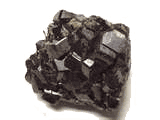 Natural Andradite Natural Andradite
Andradite is a Garnet, belonging to the Garnet group. It has the most powerful luster of any garnet, and this makes it a reputable gem.
Color: brown, greenish brown, yellowish green, green
Categories: semi-precious stone
Chemical Composition: Ca3Fe2(SiO4)3
Crystal Group: Cubic
Refractive Index: 3.82 ĘC 3.85
Hardness: 6.5
Density: 1.888 ĘC 1.889
Occurrence: Mexico, Korea, Namibia, Russia, Iran, South Africa
| 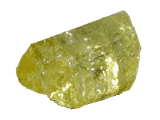 Natural Apatite Natural Apatite
Apatite displays strong fluorescence under short wave ultra-violet light. There is a particularly intense and deeply saturated, geenish-blue (aka swiss blue) variety from Madagascar known as "Neon Apatite" that is becoming quite popular in the gem trade.
Color: yellow, green, below, violet
Categories: semi-precious stone
Chemical Composition: Phosphate group
Crystal Group: Hexagonal
Refractive Index: 1.63-1.64
Hardness: 5
Density: 3.17-3.23
Occurrence: Burma, Ceylon, Madagascar, Mexico, Canada, India
|  Natural Chalcedony Natural Chalcedony
Chalcedony is a catch all term that includes many well known varieties of cryptocrystalline quartz gemstones. They are found in all 50 States, in many colors and color combinations, and in sedimentary, igneous, and metamorphic rocks.
Color: grayish, purple, white, green, blue, lavender, yellow, brown
Categories: semi-precious stone
Chemical Composition: SiO2
Crystal Group: Hexagonal
Refractive Index: 1.530 - 1.539
Hardness: 6.5
Density: 2.57 ĘC 2.64
Occurrence: Brazil, U.S.A. Germany, India, Uruguay, Austarlia, Egypt, Italy, Scotland, South Africa, Namibia, Madagascar, Mexico, Tanzania, and many other localities throughout the world.
| 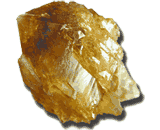 Natural Citrine Natural Citrine
Citrine is any quartz crystal or cluster that is yellow or orange in color. Although often cut as a gemstone, citrine is actually somewhat rare in nature.
Color: Yellow, orange
Categories: semi-precious stone
Chemical Composition: SiO2
Crystal Group: Trigonal
Refractive Index: 1.544-1.553
Hardness: 7
Occurrence: Brazil, Uruguay, Mexico, Russia, USA.
| 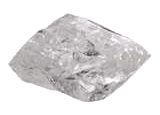 Natural Danburite Natural Danburite
Danburite is a very spiritual stone that carries a pure vibration. With a hardness of 7, danburite is quite hard and suitable for any kind of jewelry. Danburite handles easily and ordinarily offers no problems for lapidaries. It makes an especially brilliant gem because of its extreme clarity.
Color: White, yellowish, very light pink, buff colored, very light brown
Categories: semi-precious stone
Chemical Composition: calcium borosilicate
Crystal Group: Orthorhombic
Refractive Index: 1.630(+.003,-.003) - 1.636 (+.003, -.003)
Hardness: 7
Density: 3
Occurrence: Danbury, Connecticut and Russell, New York, USA; Charcas, San Luis Potosi, Mexico; Kyushu Island, Japan; Mogok, Burma and Uri, Switzerland; Madagascar.
| 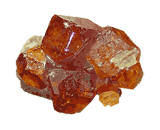 Natural Hessonite Natural Hessonite
Hessonite is one of the gem varieties of the garnet mineral, grossular. Hessonite is usually cinnamon brown and has been called "cinnamon stone". Hessonite can also be orange; this color is becoming common on the gem markets.
Color: Brownish-orange, brownish yellow, aurora red
Categories: semi-precious stone
Chemical Composition: Ca3Al2(SIO4)3
Crystal Group: Cubic
Refractive Index: 1.72-1.74
Hardness: 7.25
Density: 3.65
Occurrence: Sri Lanka, Mexico, Brazil, Canada, Madagascar
| 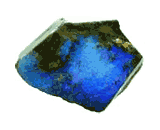 Natural Opal Natural Opal
Opal is the most colorful of all gems. It is a form of silica chemically similar to quartz, but more like glass and containing a variable amount of water within the mineral structure. Its splendid play of color is unsurpassed, and fine examples can be more valuable than diamond. Precious opals (black and white) are cut and polished into cabochons and used in all forms of jewelry.
Color: White, green, blue, black, red, orange, violet, pink, grey, yellow.
Categories: precious stone
Chemical Composition: SIO2nH2O
Crystal Group: Amorphous
Refractive Index: 1.44-1.46
Hardness: 5.5 - 6.0
Density: 2.65 - 3.00
Occurrence: Czechoslovakia, Mexico, Honduras, Australia, Brazil, Tanzania.
| 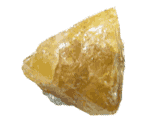 Natural Scheelite Natural Scheelite
Scheelite is a calcium tungstate mineral with the chemical formula CaWO4.With a hardness of 4.5 to 5 on the Moh's ScaleScheelite is a rather soft stone. Traditionally, it was considered a collector's gem and unsuitable for use in jewelry.
Color: Yellowish-white, brownish, orange yellow
Categories: semi-precious stone
Chemical Composition: CaWO4
Crystal Group: Tetragonal
Refractive Index: 1.918 - 1.937
Hardness: 4.5 - 5.0
Density: 5.9 - 6.1
Occurrence: Czechoslovakia; Italy; Switzerland; Finland; Cumberland, Cornwall, England; Santa Cruz, Sonora, Mexico; South Dakota, Conneticut, Colorado, Utah, California, Arizona, USA; New South Wales and Queensland, Australia; Mian Yang, and Ping Wu, Sezhuan, China; Hollinger Mine, Ontario, Canada;
|
|
